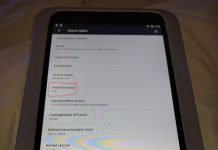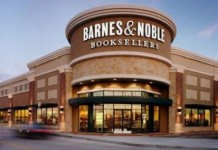 I’m hesitant to believe this story Nate’s reporting, even after clicking the links and reading the sources for myself. How could anyone in the modern e-book market be this dumb? But the writing seems to be on the wall. Barnes & Noble has removed the “Download” button from its e-book library,
I’m hesitant to believe this story Nate’s reporting, even after clicking the links and reading the sources for myself. How could anyone in the modern e-book market be this dumb? But the writing seems to be on the wall. Barnes & Noble has removed the “Download” button from its e-book library,
[Update: Nate’s posted another piece indicating B&N cited “security” as the reason for the change.]
It’s no longer possible to download a book directly from the B&N web site to your hard drive by saving it from your B&N e-book library through your browser. And that includes any previously-purchased e-books you might have imported over from your Fictionwise or eReader library.
And Barnes & Noble has explicitly confirmed that this is intentional. A Nook Customer Care representative tweeted:
We’re sorry, but the ability to sideload NOOK purchased content has been discontinued. We apologize for any inconvenience
There’s a workaround, at least for people on Windows. If you run the Nook app for Windows, you can download e-books from your library to your “My Documents/My Barnes & Noble eBooks” directory. They’ll still have B&N’s DRM on them, but there’s an easy fix for that. Of course, B&N could always disable the ability to download to that app, too—and I’ve heard that said app isn’t necessarily officially supported anymore and can be problematic for people with large libraries. I’m just glad I’ve already backed up all my B&N e-books.
Nate doesn’t draw the link in his article, but for myself, I wonder if there’s a connection to the announcement a few days ago that HarperCollins is going to start digitally watermarking its e-books in addition to protecting them with DRM, in order to be able to tell where any piracy leaks occur. Given that the efficacy of any and every extant e-book DRM is, not to put too fine a point on it, a complete joke, if someone can download a B&N e-book, they can also easily crack it.
So maybe that’s why B&N has decided it doesn’t want people to be able to download its e-books anymore—they should read them within its own apps and nobody else’s. Of course, even if that’s the case, people will still figure out workarounds, so I’m not sure how this is going to do B&N any good.
It’s especially sad this is happening right now, right when Amazon is on everybody’s hit list and people are looking for alternative book and e-book sources. In contrast to Amazon’s proprietary format, B&N’s use of standard ADEPT DRM meant that you could read its DRMed books on any reader app that supported ADEPT, even if it wasn’t B&N’s. If you thought Aldiko was a better Android e-reader, you could go for it. Well, not anymore. (Though you can still download directly from Amazon!)
Will there be sufficient outcry to convince B&N to change their minds? Might there be a government investigation? Will most consumers even notice or care?
Barnes & Noble just seems bound and determined to slide ever further into irrelevance. What a pity.

































Maybe I’m missing something, but you can’t download from Amazon in a usable format unless it happens to be DRM-free: it’ll be keyed to a specific Kindle device/application that you select.
At least with B&N, it is using a compatible DRM scheme that doesn’t require contacting an authentication server. Unfortunately, it seems that B&N would no longer like this to be an advantage of their service.
I wish consumer goods weren’t so anti-consumer. O’Reilly Publishing gets it and I can easily buy and access their products, but heaven help me if I want to buy a Blu-Ray and watch it on my tablet or when traveling abroad.
Maybe it’s just me getting older and grumpier, but I just don’t have the patience for jumping through all of these hoops for casual entertainment these days. I still buy a ton of MP3s and DVDs (easily accessed), but most of these products end up being more work than pleasure. And they cost more than the product they’re replacing! *grumble, grumble*
@LoganK, you’re right about the file from Amazon being tied to a particular device, but it’s easy enough to remove the DRM and then do anything you want with it.
Even being DRM-free at B&N doesn’t mean a darn thing if you can’t get to the file. I’d basically stopped buying from them anyway, but this seals the deal.
Given how common Amazon ereaders are, I could understand why that company might think it could get away with such a move. But Nooks? B&N should be eager to have ebooks purchased from them readable on every possible device and with every possible app.
You can’t create much of a walled garden when you’ve got a market share as small as Nooks. You should want a market as open and broad as possible.
Doesn’t Microsoft have some sort agreement involving Nooks? Maybe this is Microsoft’s doing.
@Juli, it’s easy enough today to remove Amazon DRM, but Amazon owns the entire stack and they could easily break this again. Further, Amazon uses so many formats, and could introduce new ones, that it becomes a problem to convert them all. I think the Calibre developers have handled that well, but it’s conceivable that books Amazon releases next month will be inaccessible for six months to a year.
With B&N, they don’t control the technology so it’s a much more difficult for them to move against the customer (other than small changes like removing downloads). I see that as an advantage for me as a customer.
@Michael, the point of competing in a broad market is that those players that are most effective will win. It’s expensive to race against your competitors to be the best, and B&N has not indicated a desire to invest in that manner[1]. Therefore, an open market only works against them.
[1] Their main strategy, invest in the hardware, was productive but ultimately unfruitful. Meanwhile, they have no unified strategy for applications (there are approximately 7 very different Android applications now and their 2 best applications, Nook Study and Nook for Windows 8, have been discontinued), they don’t synchronize between platforms beyond the most trivial items, support for file storage is often laughably bad, and they still don’t have a wishlist feature that works. I suspect they spent a lot of money contracting out much of this work with short-term thinking when they really should have invested in a strong, core development team.
I still think, from a geek perspective, that B&N has one of the most compelling offerings. (Amazon is clearly better when it comes to user features and ease-of-use, but I simply don’t like their technology.) I wish B&N spent as much time improving their offerings as they did making them worse or merely shuffling things around with no benefit.
I think the whole watermark issue is a bit of a joke. Once DRM is decrypted, it should be a trivial task to remove the watermark. Ultimately more and more customers are going to resent being treated like criminals.
This just underscores the point that if you don’t have it in your house on your system then you don’t own it. They can change the rules whenever they want and it’s too bad and too late. So what if you have years worth of books from them, if you weren’t smart enough to download them, then too late. Lucky I remembered to do the last few I got, but this policy is just really wrong. If my only option is to read books off of their servers then I don’t own them, I’m renting them and I shouldn’t have to pay full price. They can’t have it both ways. Ownership means control and clearly they own these ebooks, not their customers.